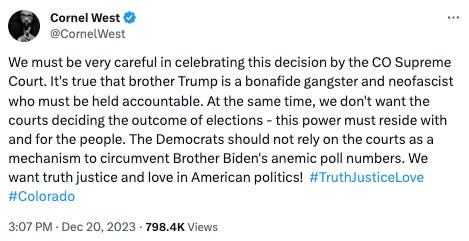It’s Very Cool and Very Legal to Disqualify Trump.
Legally and morally, Trump shouldn't be allowed to run.
Article II, Section 1, Clause 5 of the United States Constitution states three requirements someone must meet to be president. They must be 35 years old, be born a citizen of the United States, and must have lived in the U.S. for at least 14 years.
“No Person except a natural born Citizen, or a Citizen of the United States, at the time of the Adoption of this Constitution, shall be eligible to the Office of President; neither shall any Person be eligible to that Office who shall not have attained to the Age of thirty five Years, and been fourteen Years a Resident within the United States.” — Article II, Section 1, Clause 5
Following the Civil War, an additional requirement was added in Section 3 of the 14th Amendment. Along with the previous three requirements, it barred anyone who swore an oath to “support the Constitution of the United States” and then “engaged in insurrection or rebellion against the same” from holding any “civil or military office.” In layman’s terms, this means anyone who participated in an insurrection against the United States cannot be a Senator, Representative, or President.
No person shall be a Senator or Representative in Congress, or elector of President and Vice-President, or hold any office, civil or military, under the United States, or under any State, who, having previously taken an oath, as a member of Congress, or as an officer of the United States, or as a member of any State legislature, or as an executive or judicial officer of any State, to support the Constitution of the United States, shall have engaged in insurrection or rebellion against the same, or given aid or comfort to the enemies thereof. But Congress may by a vote of two-thirds of each House, remove such disability. - Section 3 of the 14th Amendment
It is this requirement that the Colorado Supreme Court and the Maine Secretary of State cited as the reason they were disqualifying Trump from their states’ 2024 Republican primaries. In Colorado, the Court ruled 4-3 in favor of a lawsuit brought by Republican and Independent voters (not Democrats) claiming Trump’s incitement of the January 6th insurrection breached the 14th Amendment’s disqualification clause and was therefore ineligible to run. The Colorado Republican Party immediately filed an appeal, which led the Secretary of State to put the Court’s ruling on pause until the U.S. Supreme Court weighs in. The Secretary of State of Maine reached a similar decision and removed Trump from the state’s ballot. Trump has stated he intends to appeal both cases to the Supreme Court, which will likely rule in his favor.
Immediately upon the Colorado ruling, commentators from across the political spectrum voiced concern about disqualifying Trump. Republicans everywhere called it election interference, and even some leftists expressed caution, warning it could set a dangerous precedent for states to remove candidates they don’t like.

As I believe it is both legal and morally correct to remove Trump from the ballot, I’m going to address the leading arguments against his expulsion. But before I do, I want to recognize that not everyone protesting this decision is doing so in bad faith. While Republicans have been quick to fill the discourse with threats and false accusations, I’ve heard from many well-meaning individuals who despise Trump but worry removing him from ballots will have down-the-line ramifications. That’s why it’s important to remember there are usually two versions of the below arguments: one from folks who want to ensure we’re not erasing the few democratic levers Americans have over their government, and another from those who have no principled belief in democracy, only using it as a mechanism to seize power and institute fascistic control.
Argument #1. “Trump hasn’t been convicted of insurrection. He shouldn’t be disqualified for something he hasn’t been convicted of.”
This is the most prominent argument against removing Trump, and it comes from both the MAGA and non-MAGA camps. But no matter who says it, the matter of conviction is irrelevant.
Nowhere in the 14th Amendment does it require a trial or conviction for a potential President to be disqualified from running. As there is no conviction requirement, logically, the responsibility for deciding who is and is not qualified falls to the states, which are responsible for conducting their federal elections.
I can already hear the counter-argument as I’m typing this. Many will claim I’m being too literal and that the writers of the 14th Amendment obviously wanted someone to be convicted of insurrection before disqualification. After all, the Constitution requires a free and fair trial for someone to be convicted of other crimes, no? Shouldn’t the same requirements apply to Trump being disqualified from the ballot?
There are a few reasons this is not the case.
First, being disqualified from being President based on insurrection isn’t a criminal charge. It’s not like trying someone for treason, but more akin to determining if they meet the 35-year-old age requirement. If I tried to run for President at 29, there wouldn’t be a trial to determine if I was eligible. Rather, all fifty Secretary of States would compare my application to the Constitutional requirements and logically determine I’m ineligible. The same goes for Trump’s insurrection.
Second, the requirement for a trial isn’t stated because attempting to try and convict every Confederate soldier from ever holding public office would have been impossible. Knowing courts could never come close to trying 1 million Confederate soldiers (plus everyone who aided the rebellion), the writers of the 14th Amendment left determining insurrectionist participation to the discretion of the states. We know this because, if the writers of the 14th Amendment had wanted candidates to be convicted of insurrection through a trial before being disqualified, they would have specifically called for trials, as they did in the 13th Amendment. The 13th, 14th, and 15th Amendments, known as the Reconstruction Amendments, were ratified in quick succession, meaning Congress was well aware it had to specify the need for a trial if it wanted one. For the 14th Amendment, they chose not to.
Neither slavery nor involuntary servitude, except as a punishment for crime whereof the party shall have been duly convicted, shall exist within the United States, or any place subject to their jurisdiction. - 13th Amendment
If Congress specifically called for trials in the 13th Amendment but didn’t in the 14th, it’s not because they “forgot” — it’s because they didn’t think they were necessary. And we know they were aware of potential misuse of the disqualification clause because they included a procedure for exemptions. They specifically stated that the “disability” of disqualification can be removed by 2/3 a vote of each House. As they went out of their way to write down specific procedures on disqualification and had just minutes prior ratified an Amendment specifying a due trial was needed, it is obvious that if the writers of the 14th Amendment thought a trial was required to disqualify an insurrectionist from becoming president, they would have included it.
Argument #2. “If you disqualify Trump, then Republican States will disqualify politicians they don’t like.”
I’ve heard this argument from both cynical Republicans threatening to disqualify Biden and other Democrats, and well-intentioned Americans who fear removing Trump will drive the GOP to take this action.
"Unless the Colorado Supreme Court's decision is overturned, any voter will have the power to sue to disqualify any political candidate, in Colorado or in any other jurisdiction that follows its lead. This will not only distort the 2024 presidential election but will also mire courts henceforth in political controversies over nebulous accusations of insurrection." — Statement by the Colorado Republican Party after the state’s Supreme Court decision
This is a common tactic of American right-wingers. They claim that if their politicians are held to account for their actions, they’ll find a way to level the same charge against their opponents. Not that I like Joe Biden, but it’s pretty clear this is why Republicans are trying to impeach him for corruption to create the image he’s equally deceitful as Donald Trump, as opposed to any of the other issues he could be impeached for.
I really don’t feel the need to provide an argument against the Republican form of this argument, as it’s not a good faith or well-reasoned belief. For those who are concerned removing Trump will inspire Republicans to play dirty, I’d say that they’ve never needed an excuse before. Republicans threatening to break the social contract has been their preferred tactic since 2008 when they began engineering debt ceiling crises and government shutdowns to delay democratically popular agendas. The Democrats have given in to their demands far too often and have gotten nothing for it. If Republicans want to claim “something something border security is an insurrection,” then let them. As stated above, Congress can re-qualify any candidate through a 2/3 vote of both houses. Let the GOP force their national politicians to vote on record if they think Biden is an insurrectionist. It will only bring more attention to the GOP’s ineptitude (see Kevin McCarthy).
Argument #3. “Everything else aside, we shouldn’t be disqualifying leading Presidential candidates. Trump may have violated the 14th Amendment, but a lot of Americans want to vote for him. It’s bad optics and will only feed is aggrieved image.”
Being a leftist in America is to be caught in a never-ending game of Calvinball — the game of Calvin & Hobbes, in which the only rule is that no two games can be played the same.
Repeatedly, the political desires of the American people are squashed by archaic and vague procedures controlled by the capitalist-political class. When railroad workers attempt to strike for sick days, they’re told the Railway Labor Act of 1926 gives Congress the right to stop them. When a $15 wage is almost a reality, we’re told the previously unknown parliamentarian is the King of America and has decreed the poor will continue to work for poverty wages. And, when a member of the ruling class appears to finally face consequences for a lifetime of political and economic corruption and crime, media figures lecture us that the 14th Amendment is more of a guideline than a rule. (But the 13th Amendment, which legalizes slave-like prison labor, is rock solid).
Like arguments #1 and #2, this one comes in many forms. I understand why many people who despise Trump don’t want him to be disqualified. They fear a backlash, driven by the image of victimhood Trump has cultivated for his followers. (I’m writing this on the morning a man shot up the Colorado Supreme Court.) But if we’re going to structure our society around what MAGA wants, then we might as well just make Trump king for life. And even if we did anoint Trump, they’d still complain and threaten us with political violence, as they did in 2016 about the popular vote, even though Trump won the Presidency.
The other variation of this argument comes wrapped in pseudo-populist language, arguing that it’s an attack on the people to disqualify a politician with a sizable following. Framing this as an assault on democracy is on its face ridiculous. Donald Trump has openly stated he does not respect the people’s democratic will, he’s lost the popular vote on three separate occasions, and he tried to overturn the people’s wish that he did not serve a second term. Make no mistake — there’s nothing “populist” about helping one of the most powerful men in society escape consequences for his anti-democratic action. Just because he pisses off Hillary Clinton doesn’t mean Trump is “anti-establishment.” He’s a member of the capitalist elite, and he broke the law by inciting the January 6th insurrection, for which disqualification from seeking the Presidency is the only logical punishment.
If Trump is allowed to run again, then the United States is admitting we have a legal system of incarceration for the people and leniency for the powerful.
If you enjoyed or learned something from this article, please forward it to a friend. And make sure you subscribe to receive new posts straight to your inbox.
Correction: An earlier version of this article stated the 13th, 14th, and 15th Amendments were passed on the same day. They were ratified between 1865 and 1870.







The funny part about saying Trump wasn't convicted of "insurrection", well, neither was Jefferson Davis.
He needs to be removed. Period.